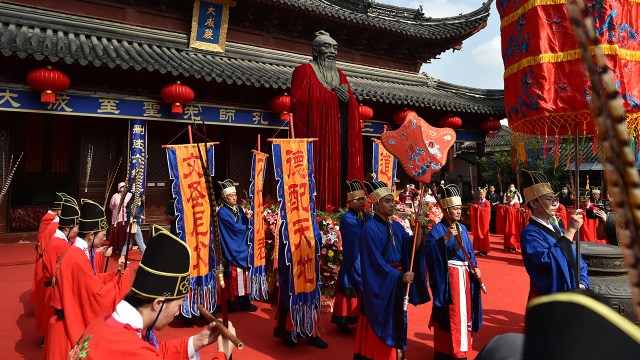
On Sept. 28, millions of people across East Asia and around the world will celebrate the birthday of Confucius – the ancient Chinese philosopher and founder of Confucianism.
They will pay respects to Confucius during ceremonies held at temples, with participants dressed in traditional costumes, performing dances and making offerings of food and drink. These rituals are part of a 2,000-year-old tradition known as the Grand Ceremony of the Worship of Confucius.
Ahead of the celebrations, here are some key facts about Confucianism and the role Confucian beliefs and values play in shaping public life for East Asians. This analysis is based primarily on surveys conducted by Pew Research Center in Hong Kong, Japan, South Korea and Taiwan in 2023. Additional information comes from academic surveys conducted in many of these places and in China between 2016 and 2018.
This Pew Research Center analysis examines the influence of Confucianism in East Asia. It is based on the Center’s June 2024 report, “Religion and Spirituality in East Asian Societies”; our October 2023 report, “Religion Among Asian Americans”; and our August 2023 report, “Measuring Religion in China.” The East Asia report was based on a Center survey of 10,390 adults conducted in Hong Kong, Japan, South Korea, Taiwan and Vietnam from June 2 to Sept. 17, 2023. Due to restrictions on foreign organizations, we did not conduct our own survey in China and instead relied on academic surveys, including the Chinese General Social Survey conducted in 2018.
The analysis on filial piety in China, Taiwan, South Korea and Japan in this post is new and comes from the sixth wave of the East Asian Social Survey. That wave was conducted as part of the General Social Survey (GSS) in these four places (i.e., the 2016 Korean GSS, the 2016 Taiwan Social Change Survey, the 2017 Chinese GSS, and the 2017 and 2018 Japanese GSSs).
Confucianism emerged from the teachings of the Chinese philosopher Confucius. He was born in the sixth century B.C.E. in what is today Shandong province on China’s east coast. His disciples described his philosophy in the book “The Analects” (Lunyu), which was published years after his death and is among Confucianism’s foundational texts.
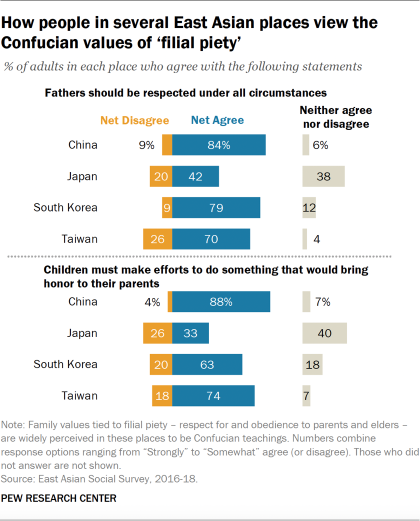
One of the main ways that Confucian values are expressed in East Asian societies today is through “filial piety.” It is a core Confucian teaching that humans are indebted to their parents and should honor them even after their death. In China, Taiwan and South Korea, most adults uphold family values centered on respect and care for parents. For instance, in China, more than eight-in-ten adults agree that fathers should be respected under all circumstances (84%) and that children must make efforts to do something that would bring honor to their parents (88%), according to East Asian Social Survey data from 2016-18.
Ancestor veneration – another expression of filial piety – is common across East Asia. These acts of worship are meant to fulfill one’s duty toward deceased ancestors in Confucian teachings.
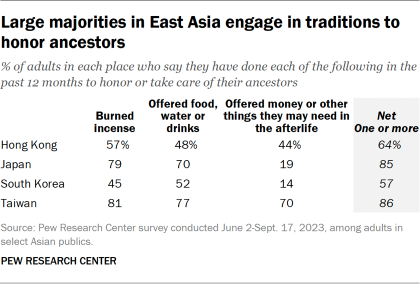
Traditional ancestor veneration practices – from burning incense to making offerings of food, drink or “spirit money” – are considered necessary in the region to ensure the comfort and happiness of ancestors in the afterlife. In the four places the Center surveyed in 2023, the vast majority of adults say they have recently engaged in one or more of these activities to take care of their ancestors, including 86% in Taiwan and 85% in Japan.
Gravesite maintenance or “tomb sweeping” is also part of the traditional practices of honoring ancestors in East Asia, particularly during certain holidays. In our East Asia surveys, most respondents who have gravesites that contain the ashes or remains of deceased family members visit these gravesites at least once a year. For instance, in Taiwan, 86% of those who have a family gravesite visit it once a year or more, and in Japan, the share is 83%. The 2018 Chinese General Social Survey found that three-quarters of Chinese adults also visited a family member’s gravesite at least once in the year prior to the survey.
Relatively few people in East Asia seem to consider Confucianism a religion – a term often understood to refer to organized, hierarchical forms of religion, such as Christianity. People in these places almost never identify as Confucian when asked about their religion. Praying or offering respects to Confucius is uncommon, and the rates of doing so are much lower than the rates of praying to Guanyin – a deity associated with compassion – and Buddha. For instance, in Taiwan, only 26% say they venerate Confucius, but much larger shares say they pray to Guanyin (69%) or Buddha (46%).
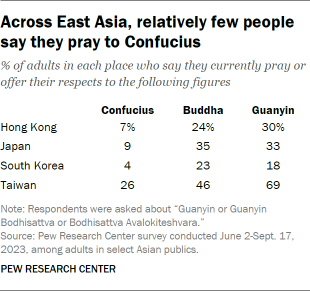
Still, some scholars argue that Confucian beliefs and practices make it a religion. For instance, Confucian teachings involve belief in the existence of tian – an invisible divine power, usually translated as “heaven” – that controls the fate and destiny of humans. And some Confucian traditions, such as Confucius memorial ceremonies and ancestor veneration, resemble religious rituals.
People in East Asia differ when it comes to having a personal connection to Confucianism – as do Asian Americans of East Asian origin. One way that the Center studies people’s affinity for religious traditions or spiritual philosophies is by asking whether they feel a personal connection to the way of life that these traditions or philosophies represent.
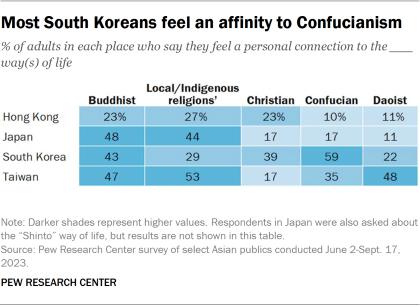
In the East Asian places we surveyed, attitudes differ widely on this measure. In South Korea, a clear majority of adults (59%) say they feel connected to the Confucian way of life. This is higher than the share who say the same about any other religious or philosophical tradition we asked about. But in Taiwan, Japan and Hong Kong, only around a third or fewer adults say they feel connected to Confucianism. In all the places we surveyed aside from South Korea, people are more likely to say they feel a personal connection to Buddhism than to the Confucian way of life.
Asian Americans of East Asian origin also differ in their connections to Confucianism. About one-in-five Americans who trace their roots to East Asia consider themselves close to Confucianism, according to our 2022-23 survey of Asian adults. There are some differences by origin group: For example, 24% of Chinese Americans and 22% of Korean Americans express a connection to Confucianism, compared with just 4% of Japanese Americans.
